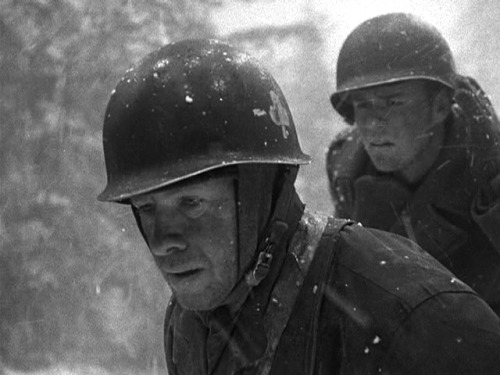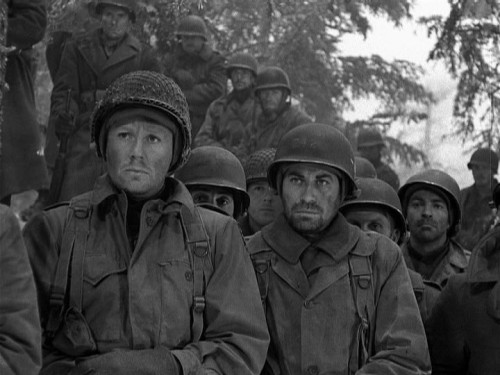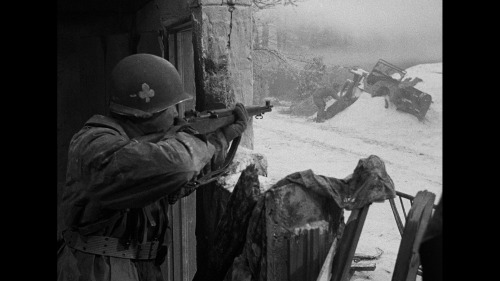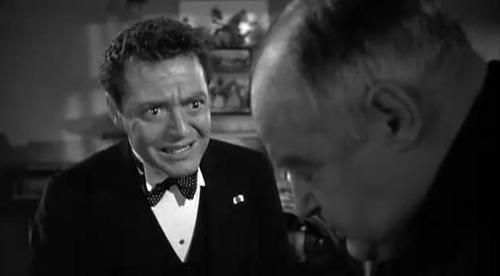#the forties

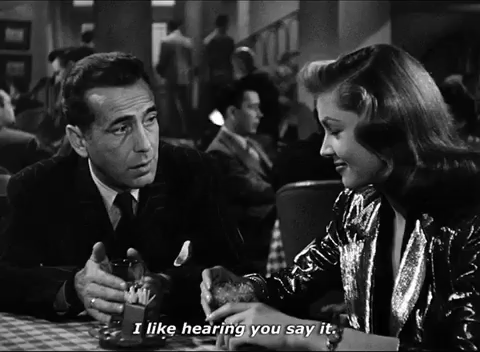
Humphrey Bogart and Lauren Bacall in THE BIG SLEEP(1946).


Lizabeth Scott and Humphrey Bogart in DEAD RECKONING(1947).
Battleground (1949) Directed by William Wellman
“You had a good home when you left; you’re right!”
That’s the march cadence for this squad of the 101st Airborne Division, on their way to Europe, where they will run head on with a counter offensive by the Germans and one of the worst winters on record. The squad won’t be singing for some time.
Ill equipped for winter weather, nearly out of ammunition and food, and trapped in the snowy, impenetrable woods of the Ardenne forest, these “citizen soldiers” (as historian Stephen Ambrose has called them) faced all the misery and deprivation that characterized the Battle of the Bulge. Director “Wild Bill” Wellman (a WWI veteran, stunt flyer, and Hollywood helraiser par excellence) therefore makes certain that we don’t get much to celebrate in this downbeat gem.
The characters are the likable G.I.s found in so many war pictures, but this group isn’t having any fun. Wellman also makes it clear that most G.I.s, courageous and patriotic as they may be, had just as soon not slog around Europe on an extended camping trip. But apart from the standard bitching—an art form for most soldiers—there is the very real fear of freezing to death, encountering surprise enemy fire in the blinding snow and fog, or simply getting separated from the outfit and never being seen again. There’s even the vague suspicion that the German counter offensive is pushing back the allied armies. The camera captures all these worries in numerous closeups of faces. Soldiers can’t hide it.
In the besieged city of Bastogne, the possibility of stemming the onslaught is weighed against remaining ammunition; in the forests, combat takes place in 11-foot banks of snow or among mazes of heavy evergreen branches. Fighting sheer exhaustion is each soldier’s key battle; a mere glimpse of sunlight might constitute a moral victory.
Although actors John Hodiak, Van Heflin, Ricardo Montalban, and a crew of character players do a remarkable job of making it feel authentic, conveying the misery most effectively is James Whitmore as the unforgettable Sergeant Kinnie. He’s a bow-legged, cigar-chomping, grizzled old vet who by God finds the means—and the spirit—to bull his way through all conceivable obstacles. When he notices his shadow in the snow, he almost cries at the revelation.
Now supplies can be flown into the combat zone.
It’s a typical G.I.’s holiday; the possibility of K-rations, new rounds for his M-1, and a blanket. Only a vet like Wellman himself might understand why this little moment is the film’s climax.
Post link
The Maltese Falcon
(1941) Directed by John Huston
Huston’s detective thriller (and impressive debut) is a bona fide classic, but it’s most enjoyable when private detective Sam Spade (Humphrey Bogart) matches wits with portly thief Kasper Gutman (Sydney Greenstreet) and effete dandy Joel Cairo (Peter Lorre), a deadly pair of fortune hunters in a feverish quest for a valuable statuette called the “black bird.”
The aptly-named Gutman offers phony sophistication and a wise-old-owl act, in the process establishing a prototype for screen villainy by demonstrating the five Cs of the criminal mastermind: courtly, calculating, cunning, cruel, and chatty. When he intones in a phony aristocratic accent to Spade, “By gad, sir, you are a character,” it’s a charming case of the pot flattering the kettle.
Meanwhile Gutman’s, um, “partner,” Cairo nervously rattles off inept threats and homoerotic affectations, all of which amuse Spade. The private eye’s smirking recognition of this pair’s numerous shortcomings provides a joy that is a hallmark of film noir: watching small, desperate men do small, desperate things. Cairo (as only Lorre could convey) is never smaller than when he shrieks his displeasure at Gutman’s error in judgment: “You imbecile! You bloated ee-diot. You stupid fat-head you!
Smallness of character doesn’t stop Kasper Gutman from waxing loopy and grandiose, boasting to Spade:
“I distrust a close-mouthed man. He generally picks the wrong time to talk and says the wrong things. Talking’s something you can’t do judiciously, unless you keep in practice. I’ll tell you right out, I am a man who likes talking to a man who likes to talk.”
Spade undercuts that pompous blather with “Swell. Let’s talk about the bird.”
This talkative hero-versus-villain standoff would be co-opted decades later for the entire James Bond series and its countless imitators. What would never be imitated is the marvelous, legendary chemistry between Greenstreet and Lorre, the pairing of whom is a grand legacy of Warner Bros.’ golden era.
Post link

